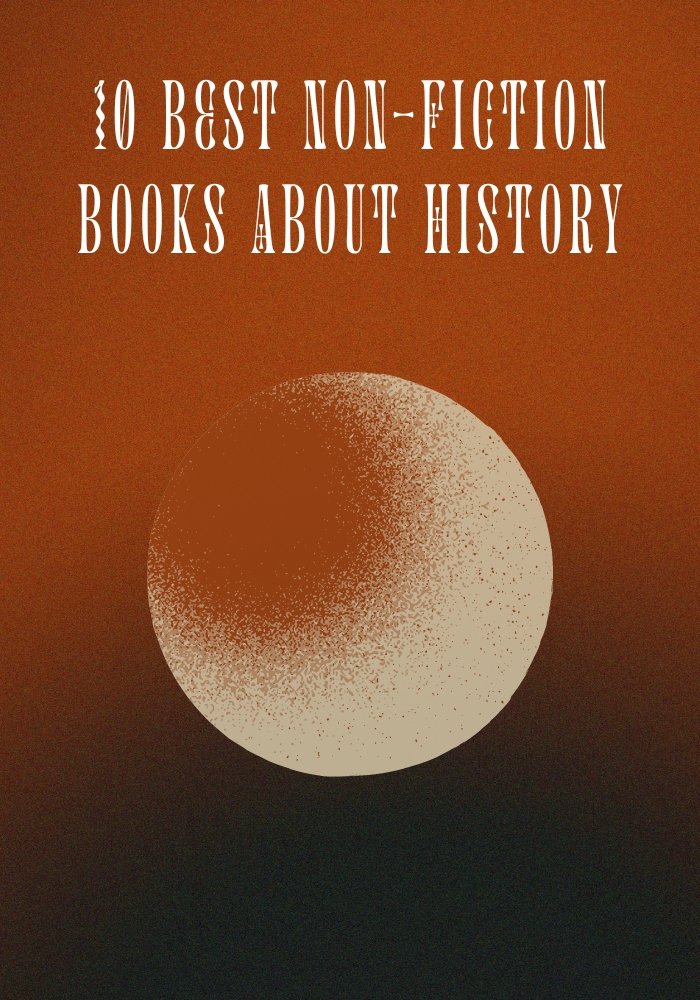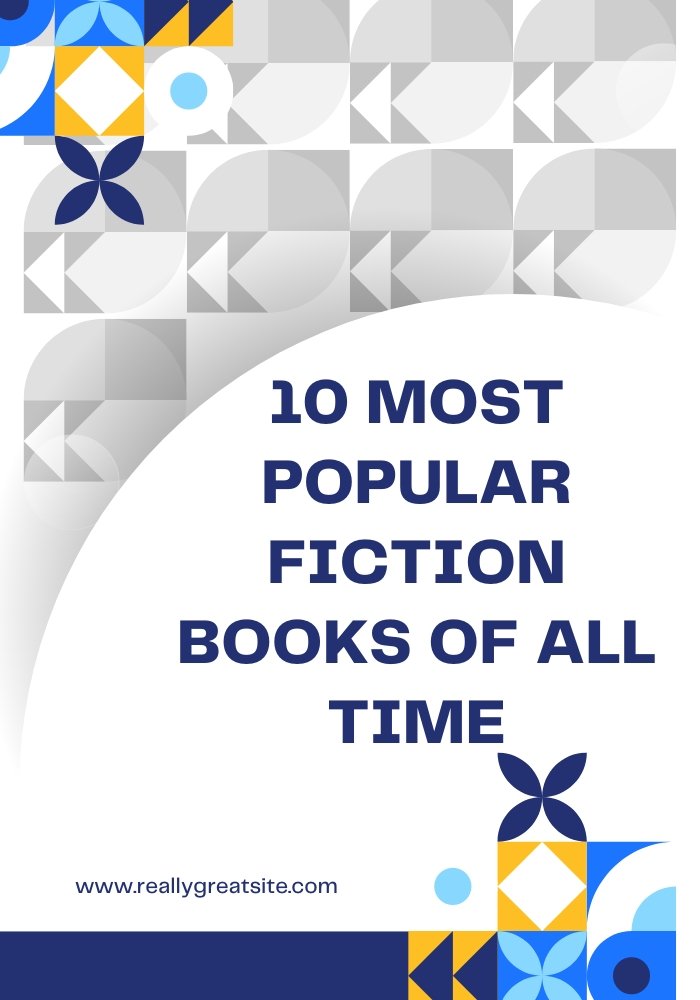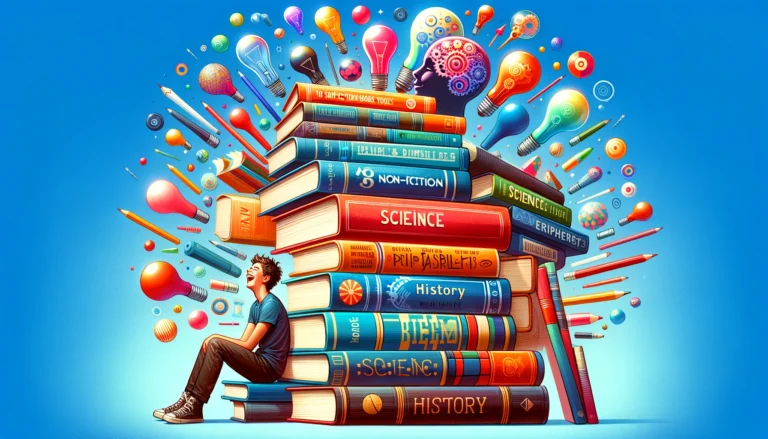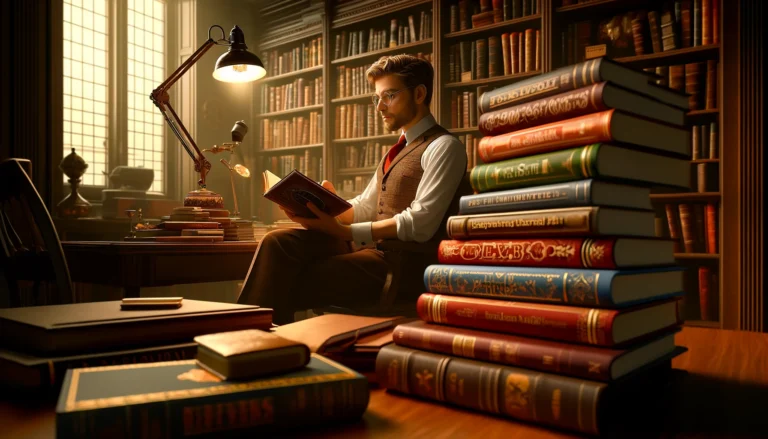Introduction
Hello, history enthusiasts and curious minds! Welcome to our journey through time and intellect. Today, we’re diving deep into the heart of our past with “10 Best Non-Fiction Books About History.” These aren’t just any books, they are gateways to understanding the intricate tapestry of human civilization. Whether you’re fascinated by the evolution of societies, the pivotal moments that shaped our world, or the unseen forces that directed the course of history, these ten masterpieces will transform your perspective. Why should you read them? Because history is not just about the past, it’s the lens through which we can foresee our future and understand our present. Let’s embark on this intellectual odyssey, where each book is a portal to a previously unimaginable realm of knowledge and understanding.
1. “Guns, Germs, and Steel” by Jared Diamond

Dive into Jared Diamond’s magnum opus, “Guns, Germs, and Steel,” and explore the fascinating explanation behind why the world is the way it is today. Diamond masterfully argues that geographical and environmental factors shaped the modern world, not just human genius or folly. His vivid narratives take you across continents, from the Fertile Crescent to the islands of the Pacific, painting a breathtaking picture of civilizations’ rise and fall. Through engaging storytelling, Diamond elevates our emotional depth towards the histories of societies often overlooked, challenging us to think about the role of fate versus human agency in history. As you turn the pages, you’ll find yourself on a journey that’s not just about the past but a reflection on the future of humanity itself.
2. “A People’s History of the United States” by Howard Zinn

Howard Zinn’s groundbreaking work, “A People’s History of the United States,” gives voice to the often silenced and marginalized figures in American history. Zinn tells the story of the United States from the perspective of indigenous peoples, slaves, women, and laborers, rather than from the viewpoint of political leaders and tycoons. This book doesn’t just recount historical events, it immerses you in the emotional lives and struggles of those who lived through them. Zinn’s narrative is a call to action, inspiring readers to rethink their understanding of American history and their role in the present and future. His conversational tone and compelling storytelling foster a deep, personal connection with history, encouraging reflective thinking and a newfound appreciation for the complexity of the past.
3. “The Guns of August” by Barbara W. Tuchman

Barbara W. Tuchman’s “The Guns of August” is a riveting account of the first month of World War I, painting a vivid picture of the great powers’ stumble into a conflict that would devastate a generation. Tuchman’s meticulous research and eloquent prose bring to life the strategies, mistakes, and human frailties that led to the war. Her ability to weave suspense and anticipation through the narrative keeps readers on the edge of their seats, eager to understand how these early decisions shaped the course of the 20th century. Tuchman’s work is not just a book about war, it’s a meditation on the nature of human conflict, power, and the choices that lead to irreversible consequences.
4. “The Silk Roads: A New History of the World” by Peter Frankopan

Peter Frankopan’s “The Silk Roads” shifts the focus from the West to the heart of Asia, offering a refreshing perspective on world history. Through the lens of trade routes, Frankopan uncovers the global impact of the exchange of goods, ideas, and cultures. This book stimulates intellectual curiosity, challenging readers to consider the interconnectedness of humanity and the ways in which our histories are woven together. Frankopan’s narrative encourages us to look beyond our cultural boundaries and appreciate the vast, rich tapestry of human civilization. “The Silk Roads” is not just a history book, it’s an invitation to see the world in a different light, sparking inspiration and a sense of global unity.
5. “Sapiens: A Brief History of Humankind” by Yuval Noah Harari

Yuval Noah Harari’s “Sapiens” takes readers on an exhilarating journey through the history of humankind, from the emergence of Homo sapiens in Africa to the complex societies we live in today. Harari challenges us to question the narratives we’ve been told about our history, society, and ourselves. His insightful analysis of historical trends is coupled with provocative questions about the future, encouraging reflective thinking about humanity’s path. Harari’s conversational tone makes complex ideas accessible, engaging readers in a deep, intellectual dialogue about what it means to be human. “Sapiens” is more than a book, it’s a mirror reflecting our past, present, and the possibilities that lie ahead.
6. “Destiny Disrupted: A History of the World Through Islamic Eyes” by Tamim Ansary

Tamim Ansary takes us on a profound journey in “Destiny Disrupted,” offering a narrative of world history through the lens of Islamic civilization. This book is a bridge, connecting readers to the rich and complex history of the Muslim world, often misrepresented or overlooked in Western narratives. Ansary crafts a story that is both enlightening and deeply human, shedding light on how the Islamic perspective of history intertwines with and diverges from the Western historical narrative. The emotional depth with which he writes about the achievements, challenges, and dreams of Islamic societies cultivates a profound respect and understanding, urging us to adopt a more inclusive view of our shared past. “Destiny Disrupted” is not just a history book, it’s an invitation to explore the mosaic of human civilization with curiosity and empathy.
7. “The Warmth of Other Suns: The Epic Story of America’s Great Migration” by Isabel Wilkerson

Isabel Wilkerson’s “The Warmth of Other Suns” is an epic tale that chronicles the Great Migration of African Americans fleeing the South for northern and western cities, in search of a better life. Wilkerson’s narrative is a masterpiece of storytelling, weaving together the personal stories of three individuals into a powerful and emotive larger story of hope, struggle, and aspiration. Through vivid imagery and a deep emotional connection, she brings to life the hardships and triumphs of millions, offering a new understanding of this pivotal period in American history. This book not only enhances our understanding of the past, it inspires us to reflect on the legacies of migration, identity, and resilience that continue to shape America today. Wilkerson’s work is a testament to the power of human spirit in the face of adversity.
8. “1177 B.C.: The Year Civilization Collapsed” by Eric H. Cline

Eric H. Cline’s “1177 B.C.: The Year Civilization Collapsed” explores the mysterious end of the Bronze Age, a time when once mighty civilizations suddenly collapsed. Cline masterfully combines archaeology, history, and paleoclimatology to offer possible explanations for this ancient disaster. His narrative is filled with suspense and anticipation, as each chapter uncovers a piece of the puzzle. Cline challenges readers to think about the fragility of civilizations and the lessons the past holds for our future. The book encourages us to reflect on how interconnected and vulnerable our world is, and how quickly it can change. Cline’s authoritative yet accessible writing makes complex ideas engaging, turning ancient history into a compelling story of human resilience and adaptability.
9. “The Wright Brothers” by David McCullough

David McCullough’s “The Wright Brothers” is an inspiring story of innovation, perseverance, and the human quest to achieve the impossible. Through the lives of Wilbur and Orville Wright, McCullough paints a vivid picture of the dawn of aviation, a testament to human ingenuity and determination. The narrative is filled with detailed descriptions of the brothers’ experiments, setbacks, and ultimate success, bringing the reader into the heart of their journey. McCullough’s conversational tone and rich storytelling evoke a sense of wonder and admiration for the Wright brothers’ achievements. This book is not just a biography, it’s a source of inspiration, reminding us of the power of vision and persistence in overcoming challenges and pushing the boundaries of what’s possible.
10. “Salt: A World History” by Mark Kurlansky
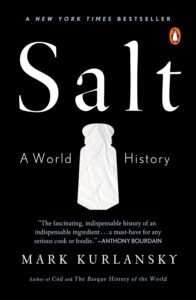
Mark Kurlansky’s “Salt: A World History” turns the seemingly mundane topic of salt into a fascinating lens through which to view human history. Kurlansky demonstrates how this common substance has shaped economies, sparked wars, and influenced cultures around the globe. With a mix of engaging anecdotes, cultural insights, and historical analysis, he crafts a narrative that is as informative as it is entertaining. The book encourages readers to look at the world around them in new ways, finding the extraordinary in the ordinary. Kurlansky’s innovative approach to history challenges us to think about how everyday items can have profound impacts on the course of human events, inspiring a deeper appreciation for the interconnectedness of our world.
Conclusion
These ten books offer more than just accounts of historical events, they invite us into the human stories behind the dates and facts. They challenge us to see history through different lenses, to understand the forces that shape our world, and to reflect on our place within it. From the evolution of human societies to the impact of salt on civilization, these narratives expand our understanding of history, fostering a deeper connection to our past, present, and future. By engaging with these texts, readers embark on a journey of intellectual and emotional growth, gaining new perspectives that can indeed change the way we think about history. Let these ten masterpieces be your guide to exploring the vast, intricate world of human history, and may they inspire you to see the

